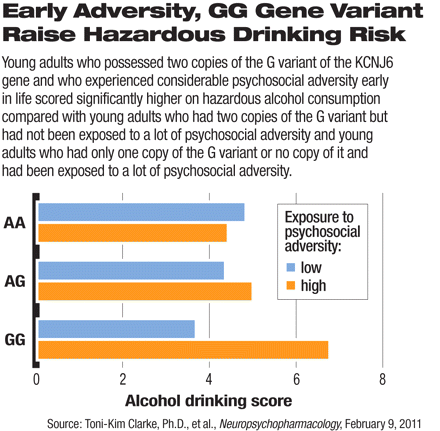Gene Mediating Teen Stress Linked to Drinking Behavior
Abstract
Early-life stress increases the propensity for alcohol abuse later in life, both human and primate studies have shown. But how might such adversity in childhood do so?
Perhaps via a gene that codes for potassium channels in dopamine nerves, a recent study suggests.
The lead investigator was Toni-Kim Clarke, Ph.D., a postdoctoral fellow at the University of Pennsylvania. The work was carried out when she was a doctoral student at the Institute of Psychiatry, King's College, London. The findings were published in the February 9 Neuropsychopharmacology.
Neurons that use the neurotransmitter dopamine are known to be heavily implicated in alcohol abuse. Ion channels are known to regulate signaling between such neurons. Some of them are called G-protein-coupled inwardly rectifying potassium channels (GIRKs). The action of GIRKs in turn has been shown to be influenced by the stress peptide corticotrophin-releasing hormone (CRH). And a gene called KCNJ6, located on chromosome 21, is known to make GIRKs.
All of this information made Clarke and her team suspect that the KCNJ6 gene might play a role in human alcoholism. They conducted two studies to find out.

First they found, after studying 1,152 adults with alcohol dependence and 1,203 control subjects without such dependence, that a particular variant of the KCNJ6 gene was indeed significantly linked with alcohol dependence. This is the so-called G variant.
They then focused on 261 19-year-olds who had been evaluated for early-life adversity and for hazardous drinking according to the Alcohol Use Disorders Identification Test (AUDIT). These adolescents had also been genotyped for the KCNJ6 gene. The researchers tried to determine whether there was any significant interaction between early-life adversity, hazardous drinking, and possession of the G variant of the KCNJ6 gene.
There was such an interaction, they found. Individuals who had experienced early-life adversity and who possessed two copies of the G variant scored significantly higher on the AUDIT instrument than did those who had experienced early-life adversity but had only one copy or no copy of the G variant. (The AG variant group scored a little higher than the AA variant group did, but the difference was not significant.)
"Our data provide the first evidence of an association of this gene variant with alcoholism in human beings," Clarke and her team concluded. "We propose that it moderates the effects of psychosocial stress in adolescents by disrupting dopaminergic signaling, and in turn this affects the rewarding effects of alcohol, predisposing individuals to [hazardous drinking]."
"Further work needs to be carried out to clarify the exact role that KCNJ6 plays in mediating stress and potentially risk for alcohol dependence," Clarke told Psychiatric News. "Increasingly, the role that brain stress systems play in the manifestation of alcohol dependence is being realized. Research into the CRH system has demonstrated its importance in mediating the dysphoric aspects of alcohol dependence, and as such, CRH receptor antagonists are being considered for the treatment of alcohol dependence."
Besides KCNJ6, multiple genes have been linked with alcoholism, and it is recognized to be a complex polygenic disorder, Clarke also pointed out. Most consistently associated with alcoholism are the alcohol dehydrogenase genes (ALDH), which are involved in alcohol metabolism and protection against heavy drinking. More recently, genes involved in biological responses to stress have been associated with alcoholism. These include CRHR1, NPY, FKBP5, genes of the adrenergic system, and now KCNJ6.
Clarke's study was funded by the European Commission, the UK-NIHR-Biomedical Research Center Mental Health, and the Medical Research Council.
An abstract of "KCNJ6 Is Associated With Adult Alcohol Dependence and Involved in Gene x Early Life Stress Interactions in Adolescent Alcohol Drinking" is posted at <www.nature.com/npp/journal/vaop/ncurrent/abs/npp2010247a.html>.



